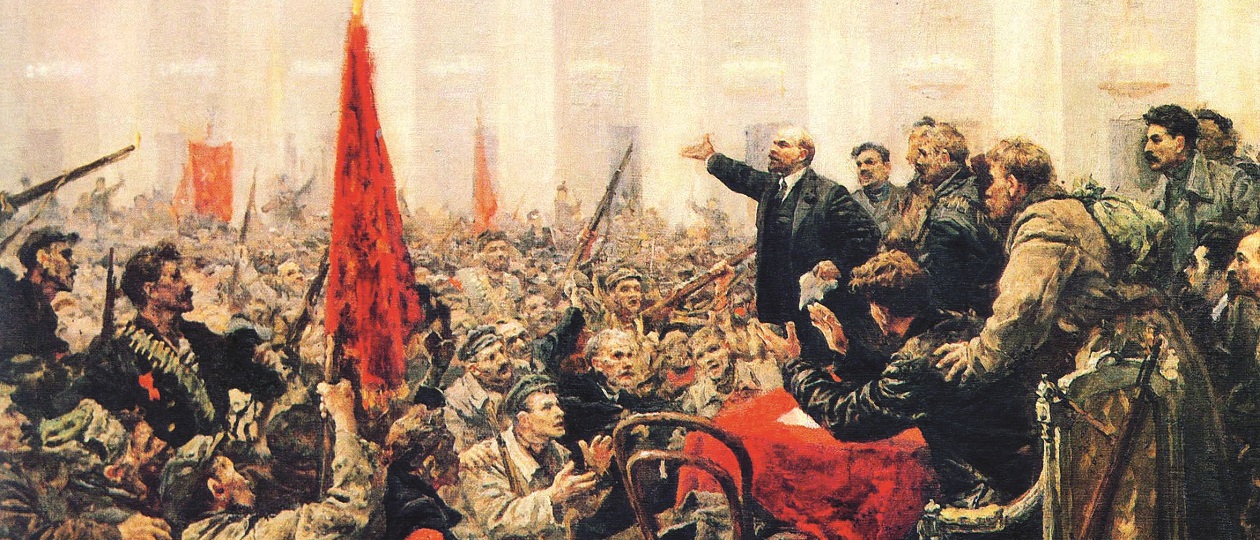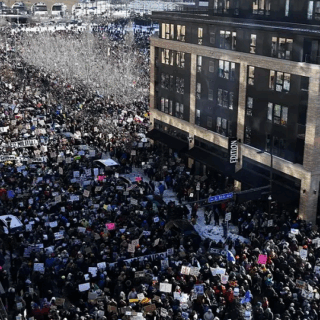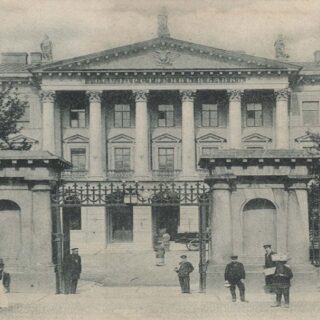
In his own way, Vladimir Lenin had to rebel against his own Bolshevik Party to lead the Bolsheviks to overthrow the Provisional Government in the October Revolution of 1917.
Beginning with his April theses almost immediately after his return to Russia from Switzerland, Lenin’s calls to launch a socialist revolution left many Bolsheviks, Mensheviks, and other Social Democrats wondering if he really was a Marxist.
As noted previously, after the February Revolution, most Socialists-Revolutionaries (SRs), Mensheviks, and Bolsheviks regarded the February Revolution as a bourgeois revolution and saw the Provisional Government as the bourgeoisie in power. A long stage of capitalist development was necessary before a socialist revolution was possible.[1, 331]
This was how revolutions had happened in Europe, especially in France, and this was how it would happen in Russia. A premature socialist revolution would only lead to the triumph of a counter-revolution and the possible return of the monarchy. Thus, the Petrograd Soviet would be vigilant and make sure that the Provisional Government enacted necessary reforms.
Stages of history could not be skipped even though most Russian socialists since the 1840s had been eager to skip the long stage of capitalist development and avoid seeing Russia turned into another liberal, bourgeois, constitutional European state. Marxist dogma on the historical process of revolution had sharply influenced the Mensheviks, Bolsheviks, and the SRs.
As early as 1901, Joseph Stalin had spelled out what was the purpose of capitalist development and bourgeois rule.
<<To unite all the participants in this movement a banner is needed, a banner that will be understood and cherished by all and will combine all demands. Such a banner is one inscribed: Overthrow the autocracy. Only on the ruins of the autocracy will it be possible to build a social system that will be based on government by the people and ensure freedom of education, freedom to strike, freedom of speech, freedom of religion, freedom for nationalities, etc., etc. Only such a system will provide the people with means to protect themselves against all oppressors, against the grasping merchants and capitalists, the clergy and the nobility; only such a system will open a free road to a better future, to the unhindered struggle for the establishment of the socialist system.>>[2]
For Stalin and nearly all Russian socialists, the political democracy of the stage of bourgeois development was useful only in that it would create the necessary conditions for a socialist revolution. Democracy was never an end in itself for Russia’s socialists. While many revolutionaries probably reluctantly accepted the historical necessity of a long stage of bourgeois development, there were revolutionaries who wanted to shorten the bourgeois stage.
Chief among revolutionaries wanting full speed ahead to the socialist revolution was Vladimir Lenin. What Lenin proclaimed in his April Theses was simply a call to return to what Russian revolutionaries had been proclaiming for decades—that Russia could bypass or abridge the capitalist stage of development and make a socialist revolution before any country in Europe.
As Lenin noted:
<<The specific feature of the present situation in Russia is that the country is passing from the first stage of the revolution—which, owing to the insufficient class-consciousness and organization of the proletariat, placed power in the hands of the bourgeoisie—to its second stage, which must place power in the hands of the proletariat and the poorest sections of the peasants.
This transition is characterised, on the one hand, by a maximum of legally recognized rights (Russia is now the freest of all the belligerent countries in the world); on the other, by the absence of violence towards the masses, and, finally, by their unreasoning trust in the government of capitalists, those worst enemies of peace and socialism. This peculiar situation demands of us an ability to adapt ourselves to the special conditions of Party work among unprecedentedly large masses of proletarians who have just awakened to political life.>>.[3]
In effect, Lenin told Bolsheviks to use the virtually total freedom, granted by the February Revolution, and the absence of government repression to go directly to a socialist revolution. The February Revolution had created ideal conditions for the next revolution. The disappearance of the right-wing parties and the collapse of all traditional authorities was a dream come true for revolutionaries.
What Lenin meant by “an ability to adapt ourselves to the special conditions of Party work” was following a policy of flexibility, elasticity (гибкость) in Bolshevik tactics, especially if this meant departing from orthodox Marxist dogma.
This would enable the Bolsheviks to rally not just workers, but also the peasants and ethnic minorities—groups considered by Social Democrats to be more reactionary than progressive. It also meant supporting and taking control of the widest variety of social organizations such as trade unions, factory committees, soviets and committees among workers, peasants, soldiers, sailors, ethnic minorities. Bolsheviks wound up working with Left SRs, SR Maximalists and anarchists who also wanted to bring about a socialist revolution immediately and they rallied to support any ethnic minority movement whose demands for autonomy or independence had been rejected by the Provisional Government. Any movement or cause opposing both the Provisional Government and the leadership of the Petrograd Soviet could be an ally of the Bolsheviks, even if the alliance was only temporary.
Lenin’s policy of flexibility was the logically inevitable result of the revolutionary concept of everything is permitted if it supports the revolution (вседозволенность).
Like the Apostle Paul, Lenin was willing to become all things to all people if hastened the collapse of the Provisional Government, the leadership of the Petrograd Soviet, and all his political rivals.
In so many ways, Lenin proved to be the most worthy heir of the People’s Will who had also pointed out the way to avoiding the capitalist stage of development and taking Russia directly to socialism. However, while many Bolsheviks supported the idea of a Soviet government replacing the Provisional Government, they meant that a Soviet government should include all socialist parties, including their opponents. Few Bolsheviks would have supported the idea of a one-party state. And so Lenin had to convince his supporters that their temporary allies were unreliable in the long run and that there was only one party in Russia ready to take power and hold it—the Bolsheviks.
Like an End Time prophet, Lenin promised his followers a speedy end of the hateful, old world and a quick coming of a glorious new age.
References
- Figes, Orlando. A people’s tragedy, the Russian Revolution, 1891-1924. New York: Penguin Books, 1998.
- Joseph Stalin. The Russian Social-Democratic Party and Its Immediate Tasks,
- Lenin, Vladimir. The Tasks of the Proletariat in the Present Revolution






2 comments
Justin Bradley
20.10.2025 at 10:53
Thank you for the article. It vividly illustrates the different positions among the Bolsheviks and other parties in 1917. The only question that remains after reading the article is why, if Lenin wanted only the Bolsheviks in power, did he share it with the left-wing SR?
James Lewis
20.10.2025 at 17:10
Hello. Thank you for the post. That’s a fascinating point about the blend of historical tradition and the expectations of the revolutionaries. Time has shown that any solution to this situation is possible. Everything depends on the personality of the leaders. Definitely adds another layer of understanding.